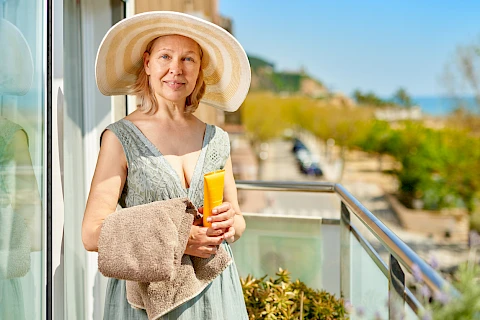
July is UV Safety Month, a time dedicated to raising awareness about the dangers of ultraviolet (UV) radiation. Protecting seniors from the sun's harmful rays is especially important. With age, skin becomes more sensitive and vulnerable to damage. By following these guidelines, you can help keep your loved ones safe during the sunny months.
What Is UV Radiation?
UV radiation is a type of energy produced by the sun. While it's necessary for producing vitamin D, too much exposure can harm the skin. This damage can lead to sunburns, premature aging, and an increased risk of skin cancer. Seniors are particularly at risk because their skin is thinner and less able to repair itself. Medications that many seniors take can also increase their sensitivity to the sun.
Best Practices for Sun Protection
There are several things seniors and their caregivers should keep in mind when managing effective sun protection.
Using Sunscreen Effectively
Sunscreen is one of the most effective ways to protect against UV damage. Choose a sunscreen with an SPF (sun protection factor) of at least 30. Make sure it protects against both UVA and UVB rays. Apply it generously to all exposed skin about 20 minutes before going outside. Reapply every two hours or more often if swimming or sweating.
Protective Clothing and Accessories
Clothing can offer excellent protection from the sun.
- Wide-brimmed hats provide shade for the face, neck, and ears.
- UV-blocking sunglasses protect the eyes from harmful rays.
- Light-colored, long-sleeved shirts and long pants offer added protection without making you too hot.
Make sure to have adequate protective clothing any time you will be outside for more than a little while.
Seeking Shade
Spending time in the shade can significantly reduce sun exposure. Try to avoid being outside during peak sun hours, usually from 10 a.m. to 4 p.m. If you do need to be outside, use umbrellas or seek out naturally shaded areas like those under trees or awnings.
Staying Hydrated
Hydration is key to maintaining healthy skin, especially in the heat. Make sure seniors drink plenty of water throughout the day. Encourage them to carry a water bottle when outside. Regular moisturizing also helps keep skin healthy. Dry skin is more prone to damage and cracking, which can make sunburn worse. Use a gentle, fragrance-free moisturizer after bathing and throughout the day as needed.
Regular Skin Check-Ups
Regular skin check-ups can help catch problems early. Skin cancers can often be treated successfully if found early. Perform monthly self-checks and visit a healthcare professional for annual skin exams.
Performing a self-check is simple. Look for new or changing moles and any spots that itch, bleed, or don't heal. Use a mirror to check hard-to-see areas or ask for help from a family member or caregiver.
When to Consult a Healthcare Professional
If you notice any suspicious changes in the skin, consult a healthcare professional. Early detection is imperative for effective treatment.
Protect Your Senior Loved Ones
Protecting seniors from UV radiation includes proper use of sunscreen, wearing protective clothing, seeking shade, staying hydrated, moisturizing skin, and regular skin check-ups. These practices can significantly lower the risk of skin damage and related health issues. We encourage caregivers to implement these steps and be proactive in offering protection to seniors. If you need more information or support in Rock Hill, Chester, York, and Clover, don't hesitate to contact Senior Helpers Rock Hill. Your loved ones deserve the best care, especially when it comes to protecting their health.